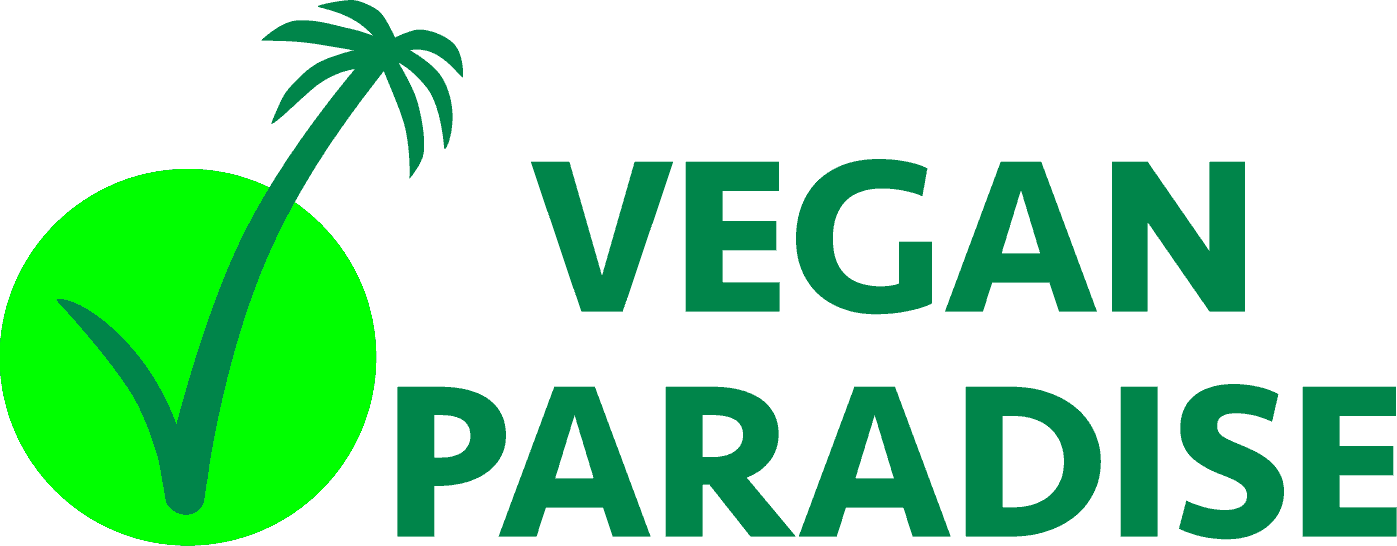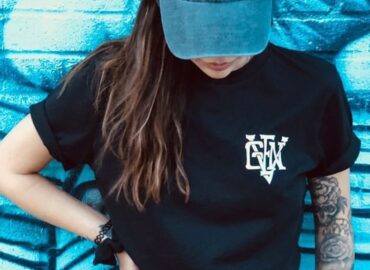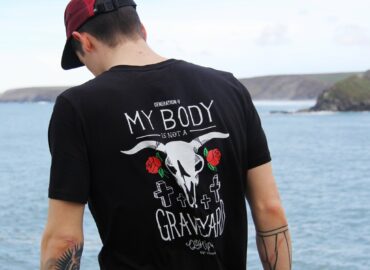Generation-V
Organic Ethical Printed in the U.K. using renewable energy
Vegan Clothing
Ethically sourced, organic cotton, printed in the UK in a renewable energy powered factory. Hand-drawn in Newquay, Cornwall. Designed to encourage conversation and promote veganism and the benefits of a vegan lifestyle.
Friend Farm Animal Sanctuary. 20% profits donated to the amazing team at Friend…
Sustainability

All of our tees are ethical and traceable, 100% organic and printed in the UK in a renewable energy powered factory. Here you can read more about how sustainability runs through our supply chain.
Organic Farming
Organic cotton is better for the producers and the ecosystem in which it is produced. Instead of more toxic pesticides and fertilisers, co planting and insect traps are used along with the special ingredient – cow poo. It encourages biodiversity and leads to the extra soft feel of our products.
Less inputs also means less water, but even organic cotton is still a thirsty crop. So where you grow it matters. The fields that grow the organic cotton for our products are in the North of India, where the monsoons fill reservoirs that supply almost all the water needed.
- Rain water, co planting, insect traps and cow poo
- GOTS certified organic
Processing

Organic cotton looks like a little bit of cotton wool bursting from a dry flower. The petals and seeds need to be removed before it can be spun. Harvested organic cotton is taken to ginning plants by camel or by truck. From there the raw material is separated out into the useful fibres which are sent to be spun. Vegetable oil is squeezed out last for use in food products. Every part of the plant is used.
Cotton farmers get a price for their cotton which is guaranteed by the regional government. Great quality batches get higher prices as ginners compete for the best stuff.
Water clean enough to drink
Wastewater from dyehouse effluent is a major source of pollution in the clothing industry. Where our fabrics are dyed, the water is recovered, cleaned and recirculated. After settling and skimming the water is filtered using reverse osmosis and distillation. This is basically sucking up water through really fine sand over and over, then boiling it.
Salt is added back in so that the dye adheres and all the cruddy mulchy stuff left over is dried out and used for road markings. About 95% of the water is recirculated and recovered.
At the end, the water coming out of the filters and going back round to be reused again is crystal clear, literally clean enough to drink. Once it has been cleaned it is then used at the input for the next batch. It is a closed loop system.
- Recirculated water
- Clean, filtered and reused
- Wastewater is drinkable

Making Products
Our products are made in a factory where the spinning, dye, weaving, cut and sew are integrated. Vertical integration leads to cost savings which can be reinvested in the facilities. This means that the environment is clean, light, modern and positive, like our factory in the UK.
Our reputation for consistent quality is a large part down to 21st century manufacturing principles at this stage and the fact that people and product don’t travel along a complex supply chain.
That also makes it easier to ensure compliance, and this factory is audited for a wide range of social and sustainability criteria. The plant is powered by renewable energy.
Renewable Energy
Throughout our supply chain renewable energy is used. In the UK we own a solar farm and power manufacturing operations with renewables. In India, the factory owns two wind farms and a 150kw PV array. Renewable energy is affordable, reliable and something we are committed to investing in.
Within our factory machine-to-machine communications technology allows us to dynamically turn equipment on and off only when it is needed, balancing our manufacturing demand with on site generation.
If you have any other questions about how our products are made please get in touch.



